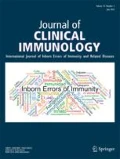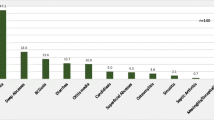Abstract
Introduction
Early diagnosis of primary immunodeficiency disorders (PID) is critical so life saving interventions can be implemented to avoid significant morbidity and mortality. Unfortunately, they are frequently misdiagnosed, which results into significant delay in diagnosis. This study aimed to determine the knowledge and practice of pediatricians in Kuwait about PID.
Materials and Methods
A 66-item self-administered questionnaire was designed and distributed to the pediatricians working at all six governmental hospitals to measure their knowledge and practice about PID. A total of 244 pediatricians (78.4%; 143 males and 101 females) participated in the study. The mean age of participants was 40 years, and the mean number of years working in pediatrics was 13 years. The mean overall score was 59.6%, whereas the mean score in clinical presentation section was 63%, in associated diseases and syndromes section 58%, and in laboratory investigations section 51%. Only 26% of the participants answered correctly at least 2/3 of the questions (67% of the questions).
Conclusion
This survey demonstrates that there is universal deficiency in both the knowledge and practice of pediatricians in the field of PID. Implementation of strategies to improve the awareness of pediatricians about PID is critical so early therapeutic interventions can be done to improve the health and prevent morbidity and mortality.


Similar content being viewed by others
References
Stiem ER, Chin TW, Hass A, Peerless AG. Infectious complications of primary immunodeficiencies. Clin Immunol Immunopathol. 1986;40:69–89.
Webster ABD. Infection in primary immunodeficiency syndrome. Curr Opin Infect Dis. 1994;7:444–9.
Ochs HD, Stiehm R, Winkelstein J. Antibody deficiencies. In: Stiehm ER, Ochs HD, Winkelstein JA, editors. Immunologic disorders in infants & children 5th ed. Philadelphia: Elsevier Saunders; 2004. p. 356–426.
Cunningham-Rundles C, Bodian C. Common variable immunodeficiency: clinical and immunological features of 248 patients. J Clin Immunol. 1999;92:34–48.
Sigstad HM, Stray-Pederson A, Froland SS. Coping, quality of life, and hope in adults with primary antibody deficiencies. Health Qual Life Outcomes. 2005;3:31–44.
Zebracki K, Palermo TM, Hostoffer R, Duff K, Drotar D. Health-related quality of life of children with primray immunodeficiency diseases: a comparison study. Ann Allergy Asthma Immunol. 2004;93(6):557–61.
Nicolay U, Kiessling P, Berger M, Gupta S, Yel L, Roifman CM, et al. Health-related quality of life and treatment satisfaction in North American patients with primary immunodeficiency diseases receiving subcutaneous IgG self-infusion at home. J Clin Immunol. 2006;26(1):65–72.
Mozaffari H, Pourpak Z, Pourseyed S, Moin M, Farhoodi A, Aghamohammadi A, et al. Health-related quality of life in Primary immune deficient patients. Iran J Allergy Asthma Immunol. 2006;5(1):23–7.
Dinakar C. Alleviating disease burden in primary immunodeficiency diseases. Ann Allergy Asthma Immunol. 2006;96(2):298–303.
Nicolay U, Haag S, Eichmann F, Hergert S, Spruck D, Gardulf A. Measuring treatment satisfaction in patients with primary immunodeficiency diseases receiving lifelong immunoglobulin replacement therapy. Qual Life res. 2005;14(7):1683–91.
Boyle JM, Buckley RH. Population prevalence of diagnosed primary immunodeficiency diseases in the United States. J Clin Immunol. 2007;27:497–502.
Chapel HM, Misbah S, Webster ADB. Assessment of the immune system. In: Ochs HD, Smith CIE, Puck JM, editors. Primary immunodeficiency diseases a molecular and genetic approach, 2nd ed. New York: Oxford University Press; 2007. p. 611–32.
Tangsinmankong N, Bahna SL, Good RA. The immunologic workup of the child suspected of immunodeficiency. Ann Allergy Asthma Immunol. 2001;87:362–70.
Eades-Perner AM, Gathmann B, Knerr V, Guzman D, Veit D, Kindle G, et al. The European internet-based patient and research database for primay immunodeficiencies: results 2004–06. Clin Exp Immunol. 2007;147(2):306–12.
Rezaei N, Aghamohammadi A, Moin M, Pourpak Z, Movahedi M, Gharazlou M, et al. Frequency and clinical manifestations of patients with primary immunodeficiency disorders in Iran: update from the Iranian primary immunodeficiency registry. J Clin Immunol. 2006;26(6):519–32.
Immune deficiency foundation releases national statistics on the treatment of primary immunodeficiency diseases. http://www.primaryimmune.org/news/survey_release.pdf (December 16, 2007.
Immune Deficiency Foundation Diagnosting & Clinical Care Guidelines for Primary immunodeficiency Diseases: http://www.primaryimmune.org (December 16, 2007).
Significant items in house and senate appropriations committee reports FY 2006 (H. Rpt. 109–143).http://www3.niaid.nih.gov/about/overview/budget/PDF/fy07_house.pdf (December 16, 2007).
Modell V. The impact of physician education and public awareness on early diagnosis of primary immunodeficiencies. Robert A. Good Immunology Symposium. Immunol Res. 2007;38:43–7.
Buckley RH. A historical review of bone marrow transplantation for primary immunodeficiencies. J Allergy Clin Immunol. 2004;13(4):793–800.
Quartier P, Debre M, De Blic J, de Sauverzac R, Sayegh N, Jabado N, et al. Early and prolonged intravenous immunoglobulin replacement therapy in childhood agammaglobulinemia: a retrospectic survey of 31 patients. J Pediatr. 1999;134:589–96.
Myers LA, Patel DD, Puck JM, Buckley RH. Hematopoietic stem cell transplantation for severe combined immunodeficiency in the neonatal period leads to superior thymic output and improved survival. Blood. 2002;99:872–78.
Champi C. Primary immunodeficiency disorders in children: prompt diagnosis can lead to life saving treatment. J Pediatr Health Care. 2002;16(1):16–21.
Antoine C, Muller S, Cant A, Cavazzana-Calvo M, Veys P, Vossen J, et al. European Society for Immunodeficiency. Long-term survival and transplantation of haemopoietic stem cells for immunodeficiencies: report of the European experience 1968–99. Lancet. 2003;361:553–60.
Al-Herz W. Primary Immunodeficiency Disorders in Kuwait: First Report from Kuwait National Primary Immunodeficiency Registry (2004–2006). J Clin Immunol. 2008;28(2):186–93.
Jeffrey Modell foundation.: http://www.jmfworld.com/ (February 15, 2008).
Author information
Authors and Affiliations
Corresponding author
Rights and permissions
About this article
Cite this article
Al-Herz, W., Zainal, M.E., Salama, M. et al. Primary Immunodeficiency Disorders: Survey of Pediatricians in Kuwait. J Clin Immunol 28, 379–383 (2008). https://doi.org/10.1007/s10875-008-9191-6
Received:
Accepted:
Published:
Issue Date:
DOI: https://doi.org/10.1007/s10875-008-9191-6



